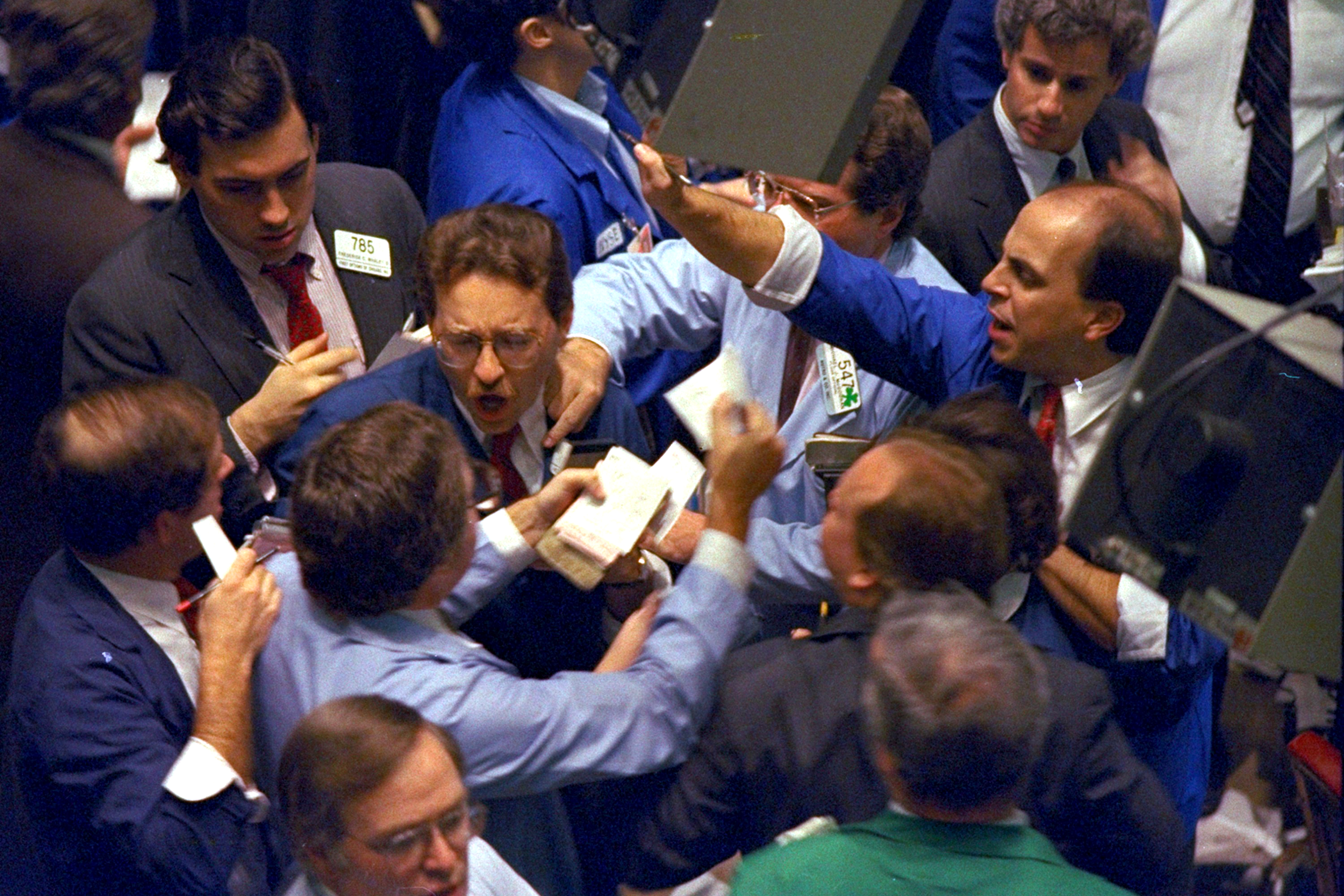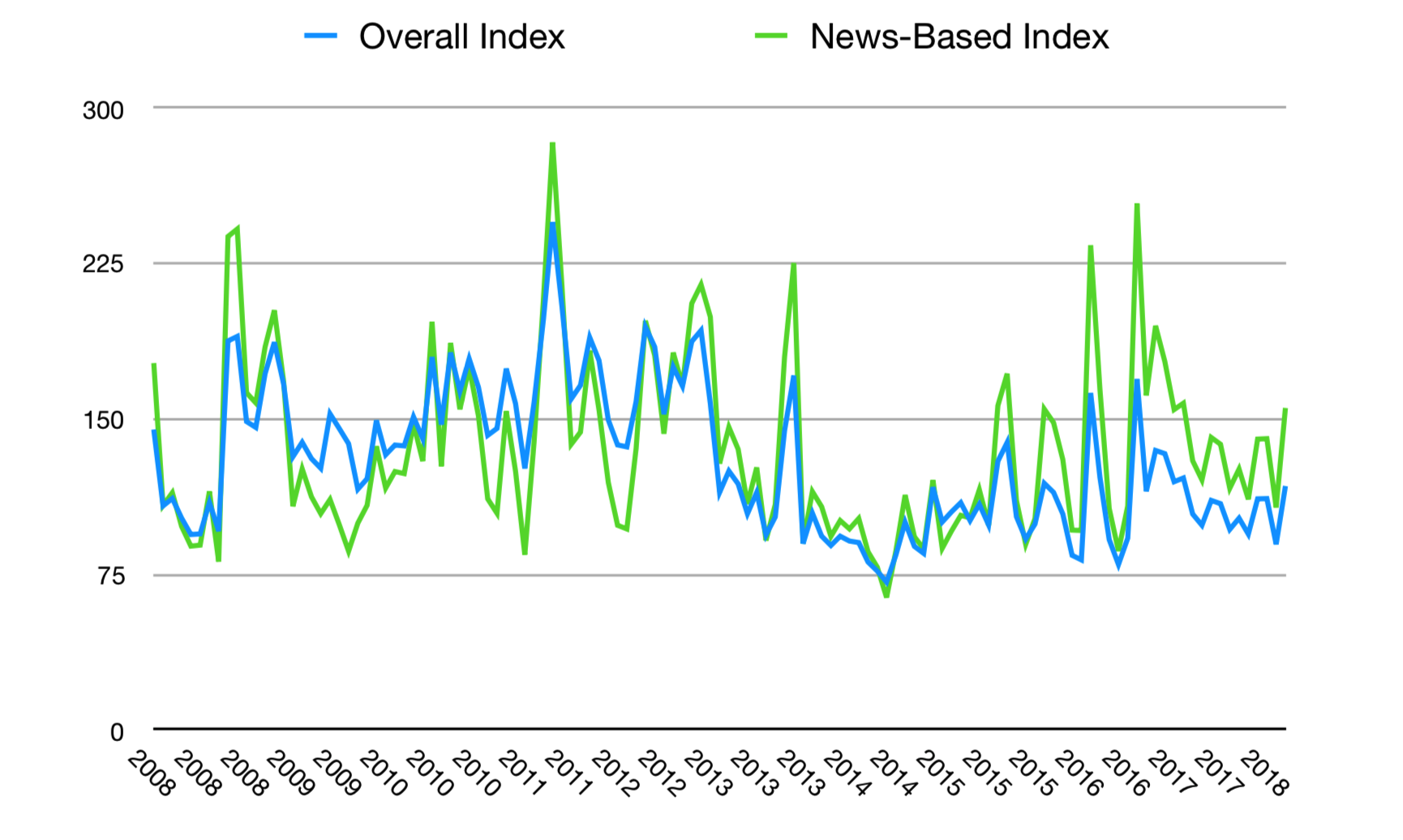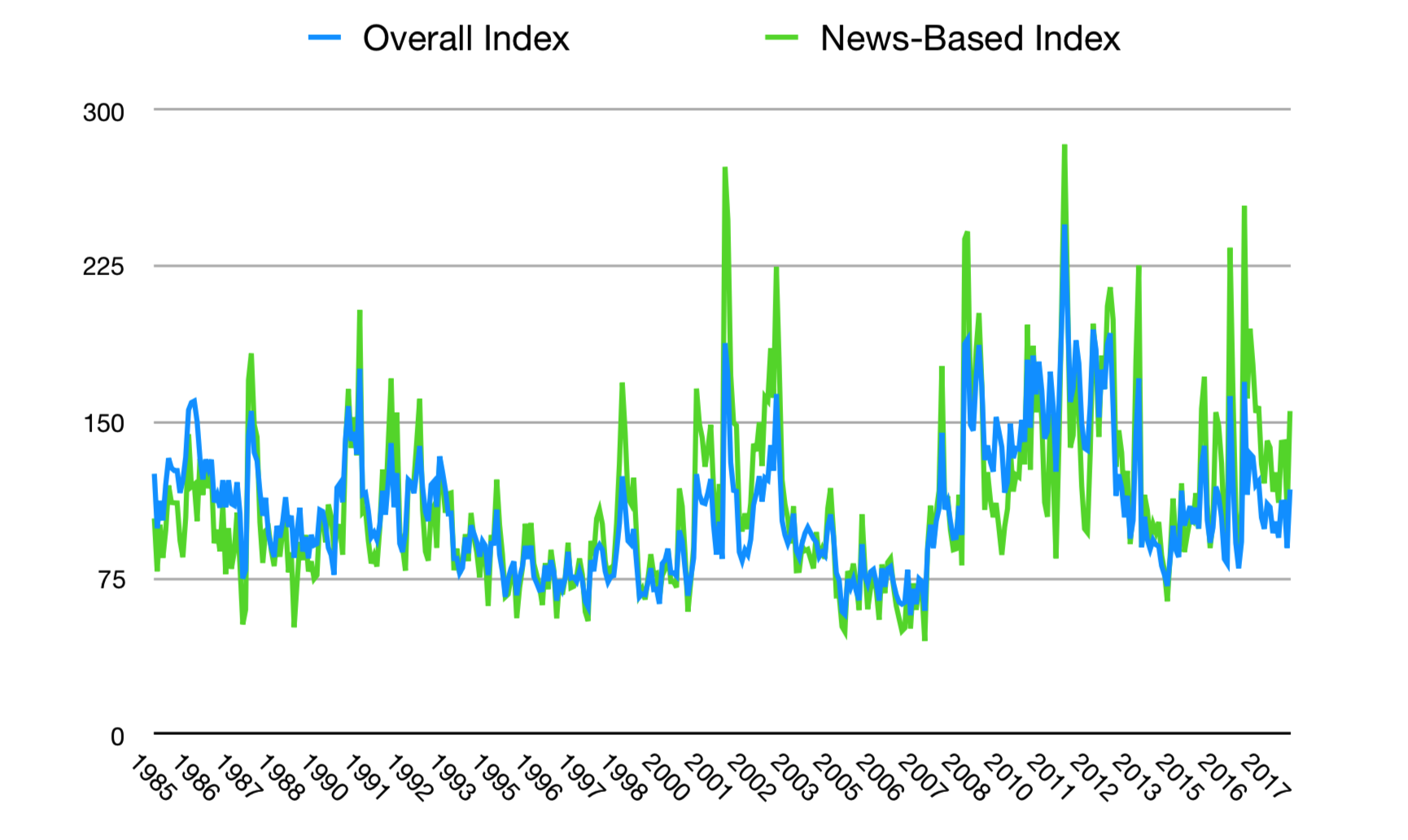What happened to economic uncertainty?
How Trump's chaotic policymaking disproved one of the dumbest ideas in economics


A free daily email with the biggest news stories of the day – and the best features from TheWeek.com
You are now subscribed
Your newsletter sign-up was successful
Whatever happened to economic uncertainty?
It's hard to remember now, but people made a big deal about it once upon a time, especially in the run-up to the 2012 election. Then-President Obama's policies, his new regulations, and the rollout of ObamaCare were all supposedly wreaking havoc with how businesses were planning for the future. And that was supposedly leading to less investment, slower job and wage growth, and a prolonged slump from the Great Recession.
These days, we have President Trump. And he makes policy the way inebriated college kids make plans. You'd think conservatives and their business allies would be freaking out, and that the economy would be tanking. But despite a recent stock market roller coaster, unemployment has fallen to remarkable lows and wages continue to rise (albeit slowly). The real economy has shown no signs of being affected by all this "uncertainty."
The Week
Escape your echo chamber. Get the facts behind the news, plus analysis from multiple perspectives.

Sign up for The Week's Free Newsletters
From our morning news briefing to a weekly Good News Newsletter, get the best of The Week delivered directly to your inbox.
From our morning news briefing to a weekly Good News Newsletter, get the best of The Week delivered directly to your inbox.
What gives?
The whole concept of uncertainty is a really slippery thing to measure. But back in 2011, three economists took a crack at it, and came up with the "policy uncertainty index." Their measure is comprised of three parts: First, how much forecasters disagree about the future path of the economy. Second, how many tax code provisions are set to expire in the near future. And third, how often the word "uncertainty" (as well as its synonyms in economic policy) appears in news reports.
Here's the index they constructed, from 2008 to the present. (It's just a snapshot — their data stretches back to the 1980s.) The blue line is the overall policy uncertainty index. The green line is just the news-based index.

Sure enough, in the mid-Obama years, we get a big burst of uncertainty. Then things calm down before picking back up as Trump's election approaches. Then it all subsides again. U.S. Bank also runs its own survey of small businesses, and the latest numbers show lower concern with economic uncertainty than at any time since 2014.
A free daily email with the biggest news stories of the day – and the best features from TheWeek.com
Should we be congratulating President Trump for soothing American business' collective uncertainty angst?
Unfortunately, there's a host of problems here.
To begin with, we're supposed to care about uncertainty because it hurts the economy. The stock market went through a recent panic, but oddly enough only after the spike in uncertainty around Trump's election abated. More to the point, as I said, the financial market tumbles haven't translated into problems for economic fundamentals at all. They remain on the same upward-if-sluggish trend they've been on for years.
Now, let's look at the whole uncertainty index back to 1985:

The uptick under Obama is also an uptick immediately in the wake of the 2008 collapse. The other upticks also come right after recessions, in the early 2000s and the early 1990s. If one-third of the index is disagreements between forecasters, that's going to be driven by downturns: In the depths of the Great Recession, predictions from the Federal Reserve, the CBO, and everyone else were all over the map. If the index correlates with economic growth, as its creators argue, it's probably because slumps increase uncertainty, not the other way around.
The third of the index driven by expirations in the tax code is also a problem. When President Bush and his GOP allies passed their big tax cut package in 2001, they designed it to expire in 10 years to get around Senate rules on deficit spending. That deadline arrived right in the middle of Obama's first term. That sparked fights between the administration and Congress over tax policy and the debt ceiling, further feeding into "uncertainty" talk. As much as anything, Obama was the victim of an uncertainty time bomb in the tax code that had been set a decade earlier. (Incidentally, the Republicans' new tax cut will do this again to whomever is president in 2027.)
That brings us to the news-filter third of the index.
As Mike Konczal once noted, it's a hilariously circular mechanism. If a bunch of politicians or experts just decided to talk up "uncertainty," the media would diligently report on it, and voilà: The uncertainty index would go up. Never mind what's actually going in the economy.
This is a potentially huge problem, since most of the "uncertainty" we're talking about — whether it's Trump's foreign and trade policy, or Obama's health-care and environmental regulations — can only be captured by this third part of the index. Tax code expirations and forecaster disagreements are other things entirely. And the news-filter index is pretty much hopelessly self-referential.
It's also completely dependent on whether or not the media gets suckered by partisan messaging and framing.
To watch economic and foreign policy under Trump is to be constantly wondering what's coming around the corner. He's gone from threatening North Korea with "fire and fury" to trying to organize a meeting between himself and Kim Jong Un. When the president finally announced new duties on steel and aluminum imports, he did it so cavalierly that much of his own White House staff was shocked by the news. This will-he-or-won't-he game has continued with other trade issues, like tariffs on China.
Republicans may not always like Trump's tariffs, and may even criticize them as creating uncertainty. But they're not going to pummel their own guy with that talking point. As for the Democrats, they have far too many other reasons to criticize Trump on any given day. So "economic uncertainty" as measured by the index remains modest, despite a large scale media and expert freakout over Trump's trade policy.
Conversely, there was a lot of uncertainty talk around Trump's election, when some liberal economists and commentators were predicting Trump's election would tank the market. You can even see the news-filter index and the overall index diverge noticeably at the start of Trump's presidency.
So perhaps we all just need to admit that by "uncertainty," everyone just means "policies from the other side they don't like." The near uselessness of the policy uncertainty index is what happens when we take the idea too seriously.
Ultimately, the only real way to provide certainty is by promising to do nothing. And no politician is ever going to campaign on doing nothing.
Uncertainty is just a fact of life under democracy.
Jeff Spross was the economics and business correspondent at TheWeek.com. He was previously a reporter at ThinkProgress.
-
 The ‘ravenous’ demand for Cornish minerals
The ‘ravenous’ demand for Cornish mineralsUnder the Radar Growing need for critical minerals to power tech has intensified ‘appetite’ for lithium, which could be a ‘huge boon’ for local economy
-
 Why are election experts taking Trump’s midterm threats seriously?
Why are election experts taking Trump’s midterm threats seriously?IN THE SPOTLIGHT As the president muses about polling place deployments and a centralized electoral system aimed at one-party control, lawmakers are taking this administration at its word
-
 ‘Restaurateurs have become millionaires’
‘Restaurateurs have become millionaires’Instant Opinion Opinion, comment and editorials of the day
-
 The billionaires’ wealth tax: a catastrophe for California?
The billionaires’ wealth tax: a catastrophe for California?Talking Point Peter Thiel and Larry Page preparing to change state residency
-
 Bari Weiss’ ‘60 Minutes’ scandal is about more than one report
Bari Weiss’ ‘60 Minutes’ scandal is about more than one reportIN THE SPOTLIGHT By blocking an approved segment on a controversial prison holding US deportees in El Salvador, the editor-in-chief of CBS News has become the main story
-
 Has Zohran Mamdani shown the Democrats how to win again?
Has Zohran Mamdani shown the Democrats how to win again?Today’s Big Question New York City mayoral election touted as victory for left-wing populists but moderate centrist wins elsewhere present more complex path for Democratic Party
-
 Millions turn out for anti-Trump ‘No Kings’ rallies
Millions turn out for anti-Trump ‘No Kings’ ralliesSpeed Read An estimated 7 million people participated, 2 million more than at the first ‘No Kings’ protest in June
-
 Ghislaine Maxwell: angling for a Trump pardon
Ghislaine Maxwell: angling for a Trump pardonTalking Point Convicted sex trafficker's testimony could shed new light on president's links to Jeffrey Epstein
-
 The last words and final moments of 40 presidents
The last words and final moments of 40 presidentsThe Explainer Some are eloquent quotes worthy of the holders of the highest office in the nation, and others... aren't
-
 The JFK files: the truth at last?
The JFK files: the truth at last?In The Spotlight More than 64,000 previously classified documents relating the 1963 assassination of John F. Kennedy have been released by the Trump administration
-
 'Seriously, not literally': how should the world take Donald Trump?
'Seriously, not literally': how should the world take Donald Trump?Today's big question White House rhetoric and reality look likely to become increasingly blurred
